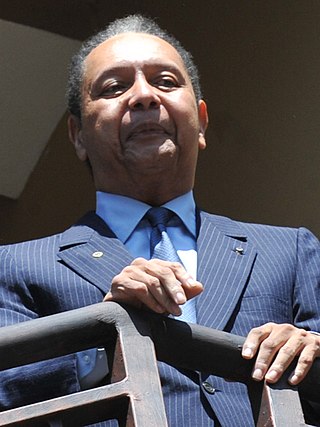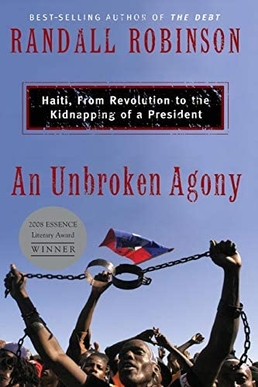Contents
Life
Born in Saint-Marc, his father, Louis Bazin was a member of the elite in Artibonite. He studied law and economics at the Solvay Institute in Brussels and later worked as an economist for the World Bank from 1972 to 1976. Bazin served as Minister of Finance and Economy for six months in 1982. [1]
He was considered to be the favorite Haitian presidential candidate of the George H. W. Bush administration and the bourgeois population of Haiti. When the country could no longer last in foreign relations as a military dictatorship and had to open the government up to free elections in 1990, Bazin was seen as a front runner if the elections were to happen before the Left in Haiti had time to reorganize. [2]
Ultimately, Bazin received 14% of the vote, Jean-Bertrand Aristide winning the Haitian general election, 1990–1991 with 67%. [3] After nine months, Aristide was deposed by a military coup. In June 1992, the army appointed Bazin as acting president. Washington's initial response was that he held the post illegally, but they soon warmed up to him and pressed Aristide to negotiate with the military and Bazin. With the change in administrations from Bush to Clinton, the policy changed. [4] [5] He resigned on June 8, 1993. [6]
Bazin was also a fervent political opponent of Aristide, and ran in the 2006 election for the presidency of Haiti, [7] but was reported to have received only about 0.68% of the vote in the 35-candidate race.
Bazin died of prostate cancer at his home in Pétion-Ville, Port-au-Prince on 16 June 2010.
Related Research Articles
The recorded history of Haiti began in 1492, when the European captain and explorer Christopher Columbus landed on a large island in the region of the western Atlantic Ocean that later came to be known as the Caribbean. The western portion of the island of Hispaniola, where Haiti is situated, was inhabited by the Taíno and Arawakan people, who called their island Ayiti. The island was promptly claimed for the Spanish Crown, where it was named La Isla Española, later Latinized to Hispaniola. By the early 17th century, the French had built a settlement on the west of Hispaniola and called it Saint-Domingue. Prior to the Seven Years' War (1756–1763), the economy of Saint-Domingue gradually expanded, with sugar and, later, coffee becoming important export crops. After the war which had disrupted maritime commerce, the colony underwent rapid expansion. In 1767, it exported indigo, cotton and 72 million pounds of raw sugar. By the end of the century, the colony encompassed a third of the entire Atlantic slave trade.

Jean-Bertrand Aristide is a Haitian former Salesian priest and politician who became Haiti's first democratically elected president in 1991 before being deposed in a coup d'état. As a priest, he taught liberation theology and, as president, he attempted to normalize Afro-Creole culture, including Vodou religion, in Haiti.

The government of Haiti is a semi-presidential republic, a multi-party system wherein the President of Haiti is head of state elected directly by popular elections. The Prime Minister acts as head of government and is appointed by the President, chosen from the majority party in the National Assembly. Executive power is exercised by the President and Prime Minister who together constitute the government. Legislative power is vested in both the government and the two chambers of the National Assembly of Haiti. The government is organized unitarily, thus the central government delegates powers to the departments without a constitutional need for consent. The current structure of Haiti's political system was set forth in the Constitution of March 29, 1987.

Jean-Claude Duvalier, nicknamed "Baby Doc", was a Haitian dictator who inherited the President of Haiti from 1971 until he was overthrown by a popular uprising in February 1986. He succeeded his father François "Papa Doc" Duvalier as the ruler of Haiti after his death in 1971. After assuming power, he introduced cosmetic changes to his father's regime and delegated much authority to his advisors. Thousands of Haitians were tortured and killed, and hundreds of thousands fled the country during his presidency. He maintained a notoriously lavish lifestyle while poverty among his people remained the most widespread of any country in the Western Hemisphere.

Fanmi Lavalas is a social-democratic political party in Haiti. Its leader is former Haitian President Jean-Bertrand Aristide. It has been a powerful force in Haitian politics since 1991. Fanmi Lavalas governments advocate a policy of "growth with equity" based on Western European social democratic principles. Fanmi Lavalas governments have emphasised investment in education and health care as their priorities and have refused International Monetary Fund austerity measures.
Louis-Jodel Chamblain is a prominent Haitian military figure who has led both government troops and rebels.
Gérard Jean-Juste was a Haitian Catholic priest who served as rector of Saint Claire's Church for the Poor in Port-au-Prince. He was also a liberation theologian and a supporter of the Fanmi Lavalas political party, as well as heading the Miami, Florida-based Haitian Refugee Center from 1977 to 1990.

General elections were held in Haiti on 7 February 2006 to elect the replacements for the interim government of Gérard Latortue, which had been put in place after the 2004 Haiti rebellion. The elections were delayed four times, having originally been scheduled for October and November 2005. Voters elected a president, all 99 seats in the Chamber of Deputies of Haiti and all 30 seats in the Senate of Haiti. Voter turnout was around 60%. Run-off elections for the Chamber of Deputies of Haiti were held on 21 April, with around 28% turnout.
Jean-Claude Bajeux was a Haitian political activist and professor of Caribbean literature. For many years he was director of the Ecumenical Center for Human Rights based in Haiti's capital, Port-au-Prince, and a leader of the National Congress of Democratic Movements, a moderate socialist political party also known as KONAKOM. He was Minister of Culture during Jean-Bertrand Aristide's first term as President of Haiti.

Ertha Pascal-Trouillot is a Haitian politician who served as the provisional President of Haiti for 11 months in 1990 and 1991. She was the first woman in Haitian history to hold that office and the first female president of African descent in the Americas.
Fwon Lespwa was a Haitian political coalition headed by René Préval, who served as president from 1996 to 2001 and from 2006 to 2011. The name Lespwa is the Haitian Creole form of the French l'espoir, meaning "hope". The coalition's full French name is Front de l'Espoir. Lespwa included many members and former members of the last government of Jean-Bertrand Aristide and his Fanmi Lavalas.

Michel Joseph Martelly is a Haitian musician and politician who served as the 42nd president of Haiti from May 2011 until February 2016. On August 20, 2024, the United States sanctioned the former president for trafficking drugs, in particular cocaine, into the United States, and for sponsoring several gangs based in Haiti.

An Unbroken Agony: Haiti, From Revolution to the Kidnapping of a President is a book on the history of Haiti by Randall Robinson in 2008.

General elections were held in Haiti on 29 November 1987, with a second round planned for 29 December. Voters were to elect the President, 77 deputies and 27 senators. However, the elections were suspended due to a massacre of voters.

The 1991 Haitian coup d'état took place on 29 September 1991, when President Jean-Bertrand Aristide, elected eight months earlier in the 1990–91 Haitian general election, was deposed by the Armed Forces of Haiti. Haitian military officers, primarily Army General Raoul Cédras, Army Chief of Staff Philippe Biamby and Chief of the National Police, Michel François led the coup. Aristide was sent into exile, his life only saved by the intervention of U.S., French, and Venezuelan diplomats. Aristide would later return to power in 1994.
Leslie Delatour (1950–2001) was a Haitian economist who served as governor of the Bank of the Republic of Haiti from 1994 to 1998, and as Haiti's Minister of Finance from 1986 to 1988.

The Haitian refugee crisis, which began in 1991, saw the US Coast Guard collect Haitian refugees and take them to a refugee camp at Guantanamo Bay. They were fleeing by boat after Jean-Bertrand Aristide, the democratically elected president of Haiti, was overthrown and the military government was persecuting his followers. The first camp reached a maximum of 12,500 people. It was then reduced to 270 refugees who either had HIV or were related to someone who did. The reduction was the result of the US policy adopting a strict policy of repatriation for both those found at sea and most of those living in Guantanamo. The HIV+ refugees were quarantined in a section of the military base known as Camp Bulkeley and faced human rights violations. They were brought to the United States after US District Judge Sterling Johnson Jr. ruled the camp was an "HIV prison camp."

Corruption in Haiti occurs at one of the worst rates in the world. Corruption disrupts all attempts to establish a rule of law, a sustainable democracy, and to improve the quality of life of Haiti's people.
Antoine Adrien was a Catholic Priest and liberation theology advocate who served as Father Superior of the Holy Ghost Order in Haiti. He also served as Director of the "Petit Séminaire Collège Saint-Martial", attended primarily by children of the country's elite. Adrien was expelled from Haiti in 1969 by the Francois Duvalier regime which accused the Holy Ghost Order of harboring communists working to overthrow the regime.
The 45th Legislature of the Haitian Parliament was in office from 4 February 1991 to 4 February 1995.
References
- ↑ R. Hall, Michael (2012). Historical Dictionary of Haiti. Scarecrow Press. p. 35. ISBN 9780810878105.
- ↑ Haiti: best nightmare on Earth, Herbert Gold, Transaction Publishers, 2001, ISBN 978-0-7658-0733-5
- ↑ CIA World Factbook 1992 Archived 2 October 1999 at the Wayback Machine
- ↑ "Love and Haiti" . Retrieved 27 April 2024– via The New Republic.
- ↑ Plunging into Haiti: Clinton, Aristide, and the defeat of diplomacy, Ralph Pezzullo, University Press of Mississippi, 2006, ISBN 978-1-57806-860-9
- ↑ "Star-News - Google News Archive Search". news.google.com. Retrieved 27 April 2024.
- ↑ Haiti Elections Washington Post
External links
Marc Louis Bazin | |
|---|---|
 | |
| Minister without portfolio | |
| In office March 14, 2002 –September 20, 2002 |
| International | |
|---|---|
| National | |
| Other | |

